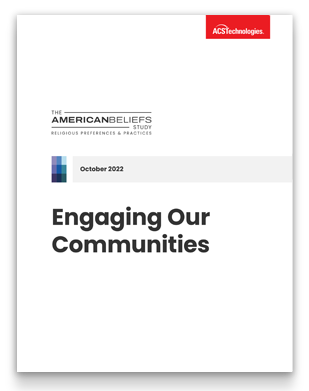Part 3 of 4
In our third blog of the series, we continue by stating that attendance and giving are down. As we look at the different generations, Gen Y (1981-1996) generation reasons from our ACST American Beliefs research based on 15,000 respondents’ personal, social, and religious concerns, we see similarities in generational views to Gen X (1965-1980), some with Boomers (1946-1964), along with some differences.
Social Issues and Concerns
As we reported in prior blogs, more than 50% of Gen X and Boomers are concerned with social issues like the planet’s environment, giving more attention to accomplishing economic justice and believing that strong families are the key to social stability. Same rings true with Gen Y or “millennials.” However, this generation does not feel as concerned that children should be raised by a mother and father or that the US should pursue avenues to illegal immigration, as compared to Boomers and Gen X, having deeper concerns with these issues.
When asked about religious preferences, 32% of Gen X stated that they had none currently and ten years ago. They were not part of any religious community, church, or faith-based organization. When looking at the concerns for the unaffiliated. The majority had similar social issue concerns as those associating with a church, minus a few exceptions. Unaffiliated millennials are less concerned about children being adequately taught good moral standards today (this differs from Boomers and Gen X). This generation feels that children today are raised with good morals. Is this because more individuals are falling away from the church as we move along in years and generations? Are morals looked at differently than in past generations? One issue that all unaffiliated individuals had in these three generations (Boomers, Gen Xs and Gen Ys) is they are not hopeful about the future of their community.
Why are the unaffiliated not part of a Religious Community today
Let’s take a look and see why Gen Y is not engaging with religious communities today. For starters, 61% do not believe in God or feel that many gods exist. That is 20% more than Gen X! Just like prior generations, they think that people in the church do not behave as Jesus would, religious people are too judgemental, the church is too focused on money, and the religious leaders are untrustworthy.
With one-fourth of this generation not affiliated with any religious community, it seems that the church is not as appealing to this generation. 91% of the unaffiliated Gen Y are unsure or do not believe God exists. With so few believing in God and lacking the desire to find a church, how can churches attract this generation into their four walls?
More than 50% of Gen Y agreed with Gen X that Jesus does not require us to attend or participate in a church to believe in Him genuinely. Like Gen X, this generation also has zero thoughts of joining a church and stated nothing would influence them to look for a church.
What can churches do to engage Gen Y?
Fewer individuals attending church are in this millennial generation. And the research shows churches struggle to engage with the younger generations. Daily, 73% of Gen Y are on Facebook, 63% are on YouTube, and 53% are on IG. 28% are on Snapchat and Twitter. Other social media platforms are more appealing to this generation. 16% are on TikTok daily, which continues to grow in numbers.
Research shows that only some generations desire to drive up to 30 mins to attend a service. With Gen Y predominantly spending more of their day on smartphones and tablets and partaking more in social media, churches will need to engage this generation electronically. If they cannot find church online, watch a service online, or participate in online events and groups, more than likely, this generation will keep away from the Church.
Next, up – Gen Z views on the church.
Downloading the American Belief Reports will allow you to uncover
- The religious activity level of Americans in communities and how it has transformed over the past decade.
- The most pressing concerns Americans face today.
- Good news and bad news about the theological beliefs of Americans and how they view places of worship.
- The priorities people want in ministry programs offered to them.
Heather joined the ACST team in 2015 within the Support Department. Today working on the Strategic Expertise team, she oversees the operations of the Strategy and Brand team. Before joining ACST, she spent several years in Real Estate as an appraiser. She realized her passion for data, research, and the value of being a voice for the client. Heather has led bible studies at her church and participated in different ministries.





